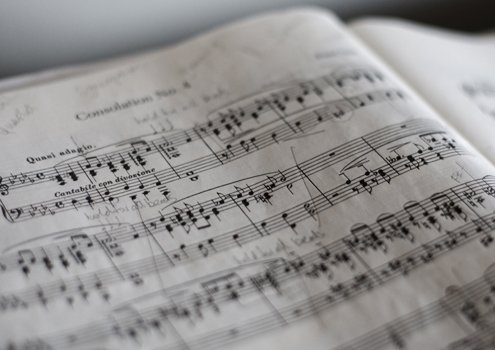Reading time: About 3 minutes
We know music has charms to soothe a savage breast. But can a little background music help the savage writer? Read on to find out.
After I’d graduated from grade 12 and moved on to higher learning — English 100 and Philosophy 120 — I discovered that my school had a recording library. Halleluiah! Sounds quaint now, I know, but this was more than a generation before iPods, and I was ridiculously excited about getting to hear music via headphones.
That said, my relationship with the library began poorly. In the booth next to me, I discovered a classmate listening to Shakespeare (Lear, I think) on a 33 vinyl recording. Fair enough, except he was listing to it at a speed of 45 (fast). And when he admitted to me, “I started listening at 78 (super fast) but found that a little too quick,” I burst out laughing and was immediately kicked out of the library for being too noisy.
I returned the next day, however, and soon settled into a nice grove. I quickly discovered that harp music — quiet, low key, not something you’d want to hum along to — worked best for me while I studied.
I’d completely forgotten about this experience until I gave a speech last week. During the question period someone asked me about listening to music while writing. Did I do it? Did I recommend it? The questioner had heard that Gregorian chant was supposed to be particularly helpful.
Truth is, while I could tolerate quiet music while studying, I’ve never been able to listen to it while writing. Too distracting! This is despite (or perhaps because of) coming from a musical household: my grandmother was a conductor, my husband sings in a choir, I play the flute and two of my kids are skilled pianists.
Besides, when I write it’s already noisy enough inside my head that I don’t particularly want any more distraction. I spoke with several friends who are professional writers and none of them write to music either.
But I had vague recollections that Mozart was supposed to be particularly inspirational so I’ve spent some time researching on the web to see if I could verify that. Apparently, a 1997 book by Don Campbell, The Mozart Effect, presents the theory that listening to Mozart may temporarily increase your IQ and enhance your creativity.
I’m trying to write this column while listening to Mozart K448 and I find it intensely distracting. I can tell because whenever my computer takes a brief break (to buffer the file) I actually write faster.
I think the idea of writing to music sounds attractive — especially when we don’t like writing very much — because it contains the idea of making something that seems boring or tedious more lively and fun. So here are my three suggestions:
1) There’s good evidence that music can change your mood. If you’re feeling tired and lazy then listening to something upbeat can indeed boost your energy. Even though I dislike ABBA on principle, I find their songs insanely energizing. Ditto for the right Indy music (I adore Basia Boulat, Ana Egge and Rufus Wainright) and I’m equally revved up by Broadway show tunes (Kristen Chenoweth singing Popular is terrific.) Of course, everyone’s taste is different, so be sure to pick music that suits you. But here’s the thing: don’t listen while you’re writing. Do it before, preferably while you’re doing something mindless, like filing.
2) Instead of listening to music while writing, go for a walk. I try to walk for an hour each day and this is some of my best writing time, even though I never write down a word ’til I return to my office. I figure out how to begin stories, fix problems in them, and decide which of my subjects need more research. Walking is marvelous for this sort of work.
3) If you’re really stuck on the idea of listening to music while you write, make sure it is quiet and has no lyrics (or, at least lyrics in a language that you don’t speak.) What you’re aiming for is minimal distraction. But don’t expect music to be a magic bullet that’s going to “cure” your writing problem. Only writing practice will do that.
I think many of us perceive writing to be hard work and frankly we’d like a way to lighten the burden. This takes me back to a crusty editor I used to work with. He liked to say: “Moving bricks is hard work. Writing is just sitting at a desk. Be thankful you’re not in construction!”


